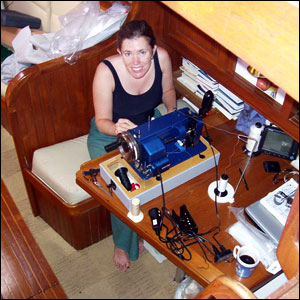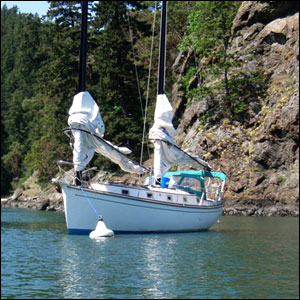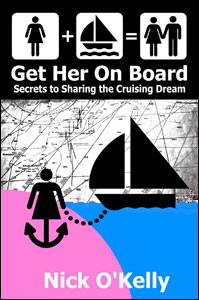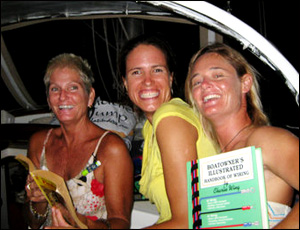 On even the most perfect weekend afternoon, we see only a handful of empty slips; most boats jostle restlessly in place like drunken tombstones.
On even the most perfect weekend afternoon, we see only a handful of empty slips; most boats jostle restlessly in place like drunken tombstones.
Smart, motivated, and capable people own these craft: doctors, lawyers, entrepreneurs, craftsmen, teachers, engineers, etc.
They’ve sacrificed and saved and dedicated significant resources for years to buy, berth, and maintain their boats, yet barely use (90% leave their slip less than six times per year) them and very, very few actually end up out there living The Cruising Dream.
Why? Not enough time? Life too crazy? Priorities changed? Out of money? I don’t buy it.
No, the real reason is that she is not on board.
While the registration may indicate joint ownership, this is most often (yes, there are many exceptions) his dream and this is his boat. You can bet that if she shared his enthusiasm, motivation, and The Cruising Dream, the boat would leave the slip more often and travel further.
So why isn’t she on board with The Dream?
Here are the top 6 mistakes (there are plenty more) men make in sharing their sailing passion with the most important person in their life and the real reason the boat sits unused in its slip.
 |
| Getting ready to depart San Diego in 2003. Having every luxury, toy, and piece of “required” equipment on a complicated boat means endless organizing. |
1. Buying a boat to “get her into sailing”
Unless he is an extraordinarily competent captain and gifted teacher, she gets the wrong first impressions about sailing and never recovers. It doesn’t take many mini-crises and raised voices to decide at a deep level that “this isn’t fun.”
2. Selling her on a brochure
Many a sales pitch involves promises of white sandy beach and crystal-clear blue water. Yes, you’ll find plenty of postcard-perfect destinations and endless free time out cruising, but often these expectations are not sufficient to sustain the sacrifice required. Because preparations usually take years, many women decide that the ends don’t justify the means. “I’ll fly there, thank you…” Additionally, a “long vacation” aboard your own boat is not representative of the cruising lifestyle, and when and if expectations are not met, she decides that life ashore is more attractive.
3. Using guilt or bullying tactics to convince her to go cruising
To get the hesitant or resistant wife on board, we men (forever little boys at heart) sometimes resort to juvenile yet powerful and manipulative tactics to convince our wives that we “hard-working” and committed husbands deserve their support; that she, “owes this to us.”
If she has been persuaded or forced to follow his dream without buying into the dream itself, she won’t ever take responsibility for the decision to go. When times get tough-and they always do-he is back in the convincing and manipulating business, which eventually fails.
 |
| “I read more books in seven months than I had in the past 17 years.” |
4. Relegating her to passenger
Men who’ve bullied, used guilt, or otherwise convinced their wives to sacrifice their life ashore for his dream subsequently carry their own guilt and feel responsible for her comfort.
She appreciates him doing all the work and taking all responsibility in the beginning, but unless she participates and owns this endeavor, she gets bored.
Boredom is the single biggest threat to the cruising dream – more lethal than any storm.
5. He lacks general competence and confidence with a large or complicated boat
![Every luxury aboard Low Pressure, but the work [literally] never ends. Every luxury aboard Low Pressure, but the work [literally] never ends.](http://www.womenandcruising.com/blog/wp-content/uploads/2010/06/NickOKelly-6-mistakes-1.jpg) |
| Every luxury aboard Low Pressure, but the work [literally] never ends. |
Cruising is not rocket science – most people can learn the basic skills: navigation, anchoring, sail handling, etc. in a relatively short period of time.
Maintaining the boat is something altogether different. In his effort to assuage his guilt and make her comfortable, he equips the boat with every possible convenience but lacks the skills to operate and maintain these systems. New or old, things break aboard a cruising boat and he turns cruising into “fixing the boat in exotic locations.”
While he is upside-down fumbling with another hack repair or pouring through manuals, she is frustrated that the two of you aren’t strolling that white sandy beach or swimming in the crystal-clear blue water.
6. Going “all-in”
It may occasionally work at the poker table, but committing every resource to cruising (a lifestyle that hopeful cruisers have no experience with) is a gamble that women (in general) are much less comfortable making than men.
Studies have shown time and again that while women are only slightly more risk-averse than men, they are much more ambiguity averse. While men are eager to head off for whatever adventure may come, women are much less comfortable with an unknown and unknowable future. “Selling it all” for The Dream neglects a reality that women wisely hold firm: almost everyone does eventually come back.
Some dreams die a quick death and never leave their local waters while others run hard onto the rocks at some sun-bleached downwind destination, but the reasons (aside from uncontrollable life circumstances) are always the same: expectations are not reached, the crew fails to learn to work together, and/or the stress of the difficult times outweighs the joy of the good.
To avoid these uncharted hazards, it’s critical that:
1. Both of you share The Cruising Dream BEFORE the cruising boat is purchased.
The financial commitment is second only to a home purchase for most couples and both materially and symbolically represents the foundation for buying into The Dream.
 |
| Our dog “Sugar” keeps us from taking any of this too seriously on the second cruise. |
2. Cruising is not simply an activity or experience, a passage or a destination; it’s a lifestyle.
The two of you must share the values embodied in that lifestyle before deciding to live The Dream: time and freedom over money and comfort, self-sufficiency over dependence, efficiency over waste, etc.
3. The relationship must be on stable footing to begin with.
Cruising will galvanize a healthy relationship but ruin a tenuous one. Communication must be equal, healthy and unrestricted.
 |
| “Traditional” 1950′s stereotypes revolt both of us, yet “pink” and “blue” jobs naturally evolve on board. Megan’s skills were invaluable on both cruises. |
4. You share equal involvement and responsibility.
Yes, “pink and blue” jobs will likely evolve naturally, but both of you must be capable of operating the boat alone. Competence = confidence = less stress. Learning [separately] from a professional instructor is money well spent.
5. One of you must be mechanically talented and proficient with every aspect of the boat.
Preferably, the cruising boat is very simple easy to maintain.
6. Have a global or holistic plan for the cruise and after the cruise.
You likely won’t stick to it, but agreeing on it in advance underpins the shared commitment. Additionally, it’s important to have a relief valve – have a fallback plan in place that doesn’t involve living in a storage unit. This restores a sense of freedom and choice which all human beings need to live a happy and fulfilled life.
I learned all of these lessons the hard way.
Our first cruise ended less than a year into our five year plan.
 |
| Freedom! Anticipation and expectations before jumping into the unknown from Catalina Island in 2003. |
I begged, cajoled, and convinced my wife to sell it all for endless fun in the tropical breeze, but that first cruise ended less than a year into our five year plan.
We sold our big, comfortable and complicated boat at a huge loss when expectations weren’t met and the hard times outweighed the good.
My wife swore, “I’m never buying another f*cking boat.”
We moved on with our lives. It took some time, but in the following years, I stopped badgering her about boats, lovely destinations, and going cruising again. Instead, together we slowly changed our values, shifting our focus from material wealth and accomplishment to time, presence, and health. Our relationship grew, matured, and deepened.
 |
| A smaller, simpler boat means less work and more play. |
Eventually we started talking about taking a sabbatical from our businesses. A few months in India? An RV trip to Central America? Cycling across the US?
Together we agreed that a smaller, simpler boat for a shorter, less fully committed itinerary made sense for the life that we wanted to live.
We made a plan, had several fallback contingencies, and picked out the right boat together.
We had a wonderful second cruise.
The boat was simple and easy to handle and both of us were capable and confident single-handing.
 |
| Balance, in both life ashore and at sea. Sausalito, California in 2010. |
Our itinerary was flexible and neither of us ever felt our freedom restricted by the other. Instead of doing maintenance, we enjoyed the destinations. The experience left us wanting more.
It’s so easy to forget that The Cruising Dream is not powered by boats, equipment, or destinations, but rather the dreamers themselves.
Making sure that the two of you in a loving relationship (that’s the reality of who you really find out there) are in tip-top seaworthy condition should be your number-one priority.
About Nick O’Kelly
 Nick O’Kelly is an entrepreneur, photographer, writer and Associated Press Award winning journalist living in Sausalito, California. His work has appeared on NBC and ABC television and USA Today.
Nick O’Kelly is an entrepreneur, photographer, writer and Associated Press Award winning journalist living in Sausalito, California. His work has appeared on NBC and ABC television and USA Today.
His recent book GET HER ON BOARD – Secrets to Sharing The Cruising Dream is available at www.getheronboard.com, Amazon.com, as well as Barnes and Noble.
See also on this website
More info (external links)
- Visit the Get Her On Board website
What advice do you have for men (or women) who want their partner to share their cruising dream?
Let us know.
Email kathy@forcruisers.com or leave a comment below.


Great article. This is an article that every man who wants his partner to go sailing should certainly read. Nick touched on most of the important issues that most couples have to deal with. Good luck and safe sailing.
I love this article, you touch on loads of valid points, Nick and your honesty is refreshing.
As a female skipper sailing in the Caribbean, I can honestly say that the cruising scene has a large contingent of male solo sailors….probably wishing they’d learned some of the lessons you have!
Great honest article. Certainly both male and femaile sailors will appreciate your experience and advice. I see so many boats that seem to only have women aboard when they are not travelling. This is great if this was always the plan.
Unfortunately I have all too often observed behavior of a sort that would have driven me off the boat, if it had ever happened to me. Some perfectly nice folks seem to turn into yelling, screaming inconsiderate folks when they are aboard. I have to wonder if they are insecure about their skills, or if they believe this is what a “Captain” does.
In any case couples seem to best when they are true partners in this endeavour as in many other.
Fair Winds
Ruth
S.V. Witchcraft
I couldn’t agree with you more, Nick, particularly on part 4, “You share equal involvement and responsibility.” Fortunately my husband understands and lives by your findings. We sail as a team. We are new, but my husband purposefully has us switch up roles. This arrangement has served us well on many fronts. First of all, for example, when I am the one adjusting the mainsail and jib, I start playing around to find the best combination. What better way to learn. I wouldn’t get that level of understanding from watching. Secondly, when he takes on a role that I have typically taken, e.g. raising the anchor, he understands better when I say, “It is very hard to put the retaining pin through when securing the anchor.” He can then come up with a solution that works. Thirdly, I understand better the decisions he makes when I know how things work. Fourthly, when Mike knows he can hand the tiller over to me, it affords him some “down time”. He has even been known to enjoy the ride up on the bow. How can I deny him that privilege? Finally, and most importantly, being able to trade roles is a safety issue (and security as well). I know that if something happens to Mike, I can man the boat until we can get help.
Knowing that Mike trusts me and respects me enough to let me try , assures me that he values my feelings and my self-worth — two very important ingredients in a lasting relationship.
Thanks for addressing this issue. We have seen others who don’t share this view. Seems like a time bomb waiting to explode.